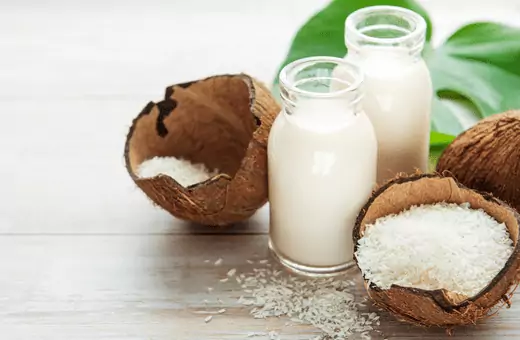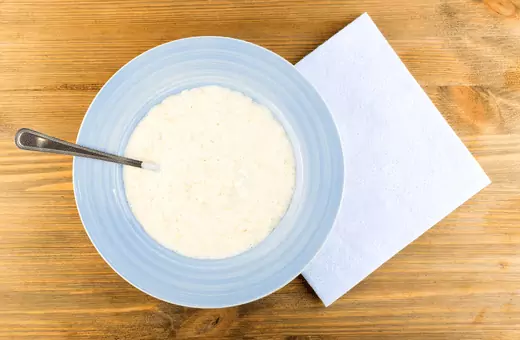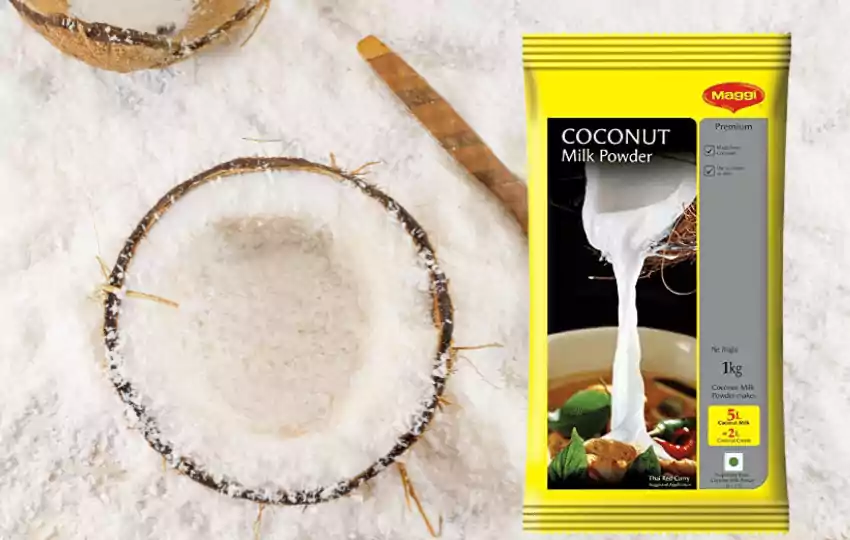Coconut milk powder is an important ingredient in vegan and Paleo cooking even in some Thai dishes. Have you ever gone halfway through a recipe and realized you were out of coconut milk powder?
Don’t worry, there’re a few things that you can use in their place! In this blog post, I will explain what is the best substitute for coconut milk powder and how to use them, whether you’re allergic to coconut or just looking for something new, we’ve covered you.
So, Just stay tuned and keep reading for some great ideas!
What is Coconut Milk Powder? What does coconut milk powder taste like?
Coconut milk powder dairy-free option for milk; is made from coconut milk that has been dried and powdered. It can be used to make various dishes, including curries, soups, and desserts.
It is an excellent origin of protein and fat, and it can also help to boost your immune system. Coconut milk powder tastes like a creamy, tropical flavor. It’s perfect for adding to smoothies, baking recipes, or just mixing with water for a quick drink.
The taste of coconut milk powder can be a little bit bland, so it is often used in dishes that are already very flavorful. This powder can also be used to thicken soups or sauces.
Although, coconut milk powder and shredded coconut are not the same. Both are made from coconut milk, but shredded coconut has a higher fat content than powder. So, both can be used in recipes.
What can I use instead of coconut milk powder?
You can use Fresh Coconut Milk, Coconut Cream, Dry Powder Milk, Rice Milk Powder, Cashew Powder, Almond Milk Powder, Oat Milk Powder, etc, instead of coconut milk powder.
What’s a good substitute for coconut milk powder?
1. FRESH COCONUT MILK -Recipe substitute coconut milk powder
My first and always preferable substitution of coconut milk powder is fresh coconut milk.
Coconut milk is a delicious, creamy alternative to dairy milk that is perfect for those people who have lactose intolerant or following a vegan diet.
While you can buy coconut milk in cartons at the grocery store, it’s actually very easy to make at home! All you require is a blender and some fresh coconuts.

Here’s how:
1. Start by cracking open 2-3 fresh coconuts. You can achieve this by slamming them with a hammer or prying them open with a sharp knife.
2. Scoop out the flesh of the coconuts and add them to your blender.
3. Add 1 cup of water for every coconut and blend on high until smooth.
4. Pour the milk through a fine-mesh strainer to remove any pieces of coconut flesh that didn’t blend up completely.
5. Store the milk in a glass jar or container in the refrigerator for up to 1 week.
Enjoy your homemade coconut milk in coffee, tea, or simply on its own! It’s a refreshing and healthy alternative to dairy milk that is sure to become a staple in your kitchen.
Coconut milk is a multipurpose ingredient that can be used in many different dishes.
It has a rich, creamy texture that makes it perfect for curries, sauces, and soups. Coconut milk is also a great dairy-free alternative for baking and cooking.
Here are some of the best ways to use coconut milk in your kitchen:
1. Curries: Coconut milk is often used as the base for curries and other Indian dishes. It adds a rich, creamy texture and helps to thicken the sauce.
2. Soups: Coconut milk can be used in soups to add creaminess and depth of flavor. It’s particularly good in Thai-style soups like tom Kha gai.
3. Sauces: Coconut milk makes a great base for sauces, such as in this Thai green curry sauce. It can also be utilized to make dairy-free cream sauces, like in this vegan Alfredo sauce.
4. Baking: Coconut milk can be used as a dairy-free alternative to cow’s milk in baking recipes. It works well in cakes, cupcakes, and other baked goods.
5. Smoothies: Coconut milk is an excellent addition to smoothies and milkshakes. It adds creaminess and sweetness without using dairy products.
6. Ice cream: Coconut milk can be used to make dairy-free ice cream. This coconut mango ice cream is a delicious summer treat.
If you like to use fresh coconut milk, you’ll need to simmer it until it thickens and then cool it completely. You can also replace an equal amount of full-fat canned coconut milk. Be sure to whisk it well before using.
2. COCONUT CREAM – Best Alternative to coconut milk powder
Coconut cream is a higher fat content than coconut milk powder, so it will give you a richer, more decadent finished product.
If you’re searching for a lighter alternative, you can use coconut milk powder Replacement. Just be sure to follow the directions on the package for the best results.
Coconut cream can be utilized in a variety of ways in cooking. It can be used as a base for soups and stews, as well as a flavor enhancer in curries and other dishes.
Coconut cream can also be used to make rich and creamy desserts such as pies, puddings, and ice cream. In addition, coconut cream makes an excellent hair conditioner and skin moisturizer.
3. DRY POWDER MILK-Easy Replacement for Coconut Milk Powder
Substituting dry milk powder for coconut milk powder is a great way to save money and still enjoy the delicious taste of coconut milk.
While the taste may not be identical, dry milk powder can still provide the same creamy texture and flavor that you love in coconut milk.
Give it a try the next time you’re looking to make a delicious and affordable meal!
4. RICE MILK POWDER- Excellent Substitute for Coconut Milk Powder
You can substitute rice milk powder for coconut milk powder. Just add the same amount of rice milk powder as you would use coconut milk powder, and your recipe will be just as delicious!
You use either store-bought rice milk powder or make it at home –
To make your own rice milk powder, combine cooked rice, water, and a sweetener of your choice in a blender or food processor. Mix until the mixture is completely smooth, then pour it into a clean, dry bowl or container.
You can also add extra flavorings such as vanilla extract or chocolate to the mixture if desired. Allow the combination to cool completely before covering and storing in the fridge for up to 2 weeks.
When you’re prepared to use it, simply add water and stir until desired consistency is reached.
There are many uses for rice milk powder in cooking, including as a thickener for soups and sauces or as a non-dairy alternative to milk powder in baking recipes.
5. I Substitute CASHEW POWDER For Coconut Milk Powder
If you want to create a vegan version of this recipe, you can substitute cashew powder for coconut milk powder.
Simply dissolve the cashew powder in the water for a few minutes before adding it to the remaining ingredients. This will allow to thicken the mixture and give it a creamier texture.
Cashew powder can be used as a thickener for soups and sauces or as a spice in many dishes. It can also be utilized to make cashew cheese or cashew cream.
When used in baking, it can give cakes and cookies a lovely nutty flavor. Cashew powder is also a great way to add protein and healthy fats to your diet.
Add it to smoothies, oatmeal, or yogurt for an extra boost, or use it in baking recipes to create more nutritious versions of your favorite desserts.
Experiment with different ways to incorporate cashew powder into your diet and see what you come up with!
6. Try ALMOND MILK POWDER for Coconut Milk powder substitute Baking recipes.
You can substitute almond milk powder for coconut milk powder. Just add the same amount of almond milk powder as you would use coconut milk powder, and your recipe will turn out great!
Almond milk powder is a great vegan replacement for coconut milk powder because it has a similar flavor and texture.
You can use almond milk powder to add a creamy, nutty flavor to soups, stews, and sauces.
It can also be used as a dairy-free alternative to cow’s milk in baking recipes. To reconstitute the milk, simply mix 1 cup of powder with 2 cups of water.
7. OAT MILK POWDER for Dried Coconut milk powder substitute
To substitute oat milk powder for coconut milk powder, you’ll need to use a little less than you would the coconut milk powder.
Oat milk powder is denser, so it will take up more space in your measuring cup. For every 1 cup (80 grams) of oat milk powder, you’ll need to use 3/4 cup (60 grams) of coconut milk powder.

Uses:
1. Oat milk powder can be used as a thickener for soups and sauces.
2. It can also be used to add creaminess and body to smoothies and shakes.
3. Oat milk powder is a great vegan-friendly alternative to dairy milk powder in baking recipes.
4. It can also be used as a coffee creamer or added to oatmeal for extra creaminess and flavor.
Read More- Best Coconut Soda Substitutes
How do you make coconut milk powder at home?
Making coconut milk powder at home is easy to do and only requires a few ingredients. First, you need to start with fresh, raw coconut meat. You can either use whole coconuts or buy pre-shredded coconut flakes.
To produce coconut milk powder at home, you will need:
– 1 cup of unsweetened shredded coconut
– 1 cup of boiling water
– A blender or food processor
– A strainer or cheesecloth
– A bowl
– A airtight container
Directions:
1. Add the coconut to the blender or food processor, and pulse until it is finely ground.
2. Pour the boiling water over the coconut, and let it sit for 5 minutes.
3. Blend the mixture until it is smooth.
4. Strain the mixture through a strainer or cheesecloth into a bowl.
5. Let the mixture cool, then dry the moist residue then transfer it to an airtight container. Coconut milk powder will last for up to 6 months when stored in a cool, dark place.
Read More- Best Substitutes for Nut Milk Bag
What is the difference between coconut milk powder and coconut water powder?
Coconut water is 94% water and contains minimal fat. It is not to be mistaken with coconut milk, which is made by blending grated coconut meat and water. Coconut milk comprises around 50% water and is heavy in fat.
Bottom Line: Substitute For Coconut Milk Powder
There are many substitutes for coconut milk powder, but not all of them are created equal. Some may work well in certain recipes, while others may not be suitable at all.
It is important to experiment with different substitutes to find the one that works best for you and your recipe.
With a small trial and error, you should be able to find a delicious and healthy substitute for coconut milk powder that you can enjoy in all of your favorite recipes.
FAQ on coconut milk powder Alternatives
Q1. Is coconut milk powder the same as coconut milk?
No, coconut milk powder is not the same as coconut milk.
Coconut milk powder is made from dried, shredded coconut meat that has been ground into a fine powder. The powder is then reconstituted with water to create a liquid that resembles milk.
Coconut milk, on the other hand, is made by steeping grated or shredded coconut meat in hot water until it breaks down and forms a milky liquid.
Coconut milk powder can be utilized as a dairy-free alternative to cow’s milk or soy milk in baking recipes or as a creamer for coffee and tea. It can also be reconstituted and used in place of coconut milk in curries or other savory dishes.
Q2. Does powdered coconut milk work?
Powdered coconut milk works just as well as regular coconut milk. It can be used in any recipe that calls for coconut milk, and it will add a rich, creamy flavor.
Q3. Can I use coconut flour instead of coconut milk?
You can use either coconut flour or coconut milk as a replacement for each other in recipes.
Both ingredients are derived from coconuts, and they have a similar nutritional profile. Coconut flour is a more concentrated source of nutrients than coconut milk. It has low calories and fat.
However, it is necessary to note that coconut flour is much more absorbent than coconut milk. This means that you will need to use less coconut flour than you would coconut milk in order to achieve the same consistency in your recipe.
When substituting coconut flour for coconut milk, start by using 1/4 cup of coconut flour for every 1 cup of coconut milk. You may need to adjust the amount of liquid in your recipe depending on how much moisture the coconut flour absorbs.
Q4. Can I substitute coconut milk powder for coconut flour?
There is no one-to-one substitution for coconut flour and coconut milk powder. Coconut flour is made from the dried, ground meat of the coconut, while coconut milk powder is made from the liquid that comes from pressing the meat of the coconut.
Both have a high-fat content, but coconut flour has more fiber than coconut milk powder. When using either in recipes, you may need to experiment to find the right ratio for your particular dish.
Q5. Can coconut milk powder be substituted?
Coconut milk powder can be utilized as a substitute for regular milk powder in many recipes. It is important to note, regardless, that coconut milk powder is not a complete replacement for all the nutrients found in regular milk powder.
Q6. Is coconut milk powder desiccated coconut?
No, coconut milk powder is not the same as desiccated coconut.
Coconut milk powder is produced from the pulp of coconut and has a creamy texture. Desiccated coconut is made from dried meat of the coconut and has a coarse, dry texture. Both products are used in different ways in cooking.
Q7. Is coconut powder the same as shredded coconut?
Yes, coconut powder is made from ground-up shredded coconut.
It has a finer, more powdery texture than shredded coconut and can be used as a 1:1 replacement in many recipes. Because it is less coarse than shredded coconut, it may blend better into smoothies and other beverages.
Coconut powder can also be used as a natural sweetener or thickener in various recipes.

